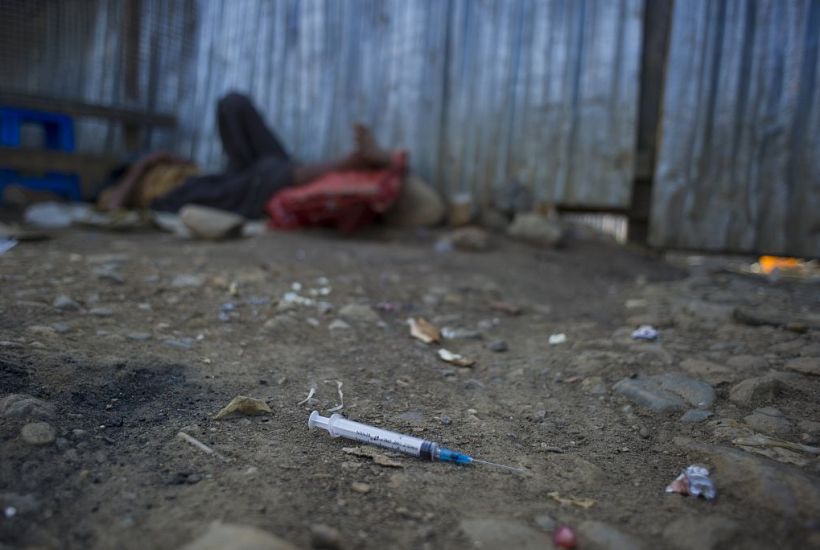I love the smell of hypocrisy in the morning, and Twitter always is pungent with its bitter almond aroma.
Today I was gobsmacked by a tweet by the Croakey health activist website, very influential in the public health community and immersed in social justice Left causes. Indeed, one of its co-founders was well-known anti-everything lobbyist and Twitterer, Professor Simon Chapman.
Croakey was Tweeting an article by a UnitingCare executive dealing with drug and alcohol abuse, Laurence Alvis, attacking the Turnbull government’s budget for funding a pilot of drugs testing on welfare recipients. The government’s decision was decried by Croakey and Alvis as anything but the ‘act of love’ Prime Minister Malcolm Turnbull last week claimed it to be. Alvis writes:
It has become increasingly clear that the drug testing and quarantining/removal of benefits model is an entrenched policy goal for the Turnbull Government. It is a model driven by ideology (not evidence) and a refusal to recognise illicit drug dependence as the result of anything other than a failure of the individual…But further entrenching the stigmatisation of some of the most vulnerable and marginalised people within our communities and creating additional barriers to recovery is not a solution.
Alvis is writing from conviction and from the perspective of someone closely involved with vulnerable Australians struggling with drug addiction. His views are sincere and should be respected. Indeed, he could well be right.
He is, however, seeing it entirely from his clients’ side of the fence and, typically of the social justice Left, ignores that the deeper issue here is welfare is a privilege, not a right. If the government, on behalf of those paying the taxes that fund welfare, wants to impose additional personal obligations on welfare recipients it believes are at particular risk of illicit drug use, it is perfectly within its rights to do so. Voters deserve action on drugs in return for their money: not simply to send the message to users that drug use is dangerous, addictive and anti-social, but hopefully providing additional avenues of reaching people who are in trouble or at risk, and helping them deal with their addiction before it’s too late.
In that sense, Turnbull is right and Alvis is wrong: it truly is an act of love – to the extent that officialdom has any capacity or obligation to love at all.
What is predictably disappointing about the Croakey and public health lobby’s negative reaction to the budget measure, however, is its utter hypocrisy. Applying drug testing to welfare benefit conditions is what those experts would call a ‘nudge’ measure, a use of public policy and legislation to change the behaviours of individuals to conform to standards set by others.
The same people decrying this well-intentioned measure are full-on nudgers opposed to pretty well all pleasurable vices. These are the same people who want to punish smokers by raising taxes and excises to make cigarettes unaffordable, and by treating smokers and vapers in public places as worse than lepers. These are the people who want to end the concocted obesity ‘epidemic’ by taxing the bejesus out of soft drinks and anything else that contains sugar. These are the people who persuaded governments to outlaw alcopops, forcing teenage drinkers to mix their own, far more potent, cocktails. And these are the people who want to stigmatise everyone who likes a flutter as a problem gambler incapable of making rational decisions for themselves.
That the target demographics for these regressive, nanny state interventions are, on the whole, the lower end of the socio-economic spectrum, and public health poohbahs’ lust for financial penalties for ‘bad’ behaviour is highly regressive. These nudges hurt those least able to afford to pay for the privilege of said poohbahs’ self-righteous determination to tell us how to live. These policy Solomons, these Brunswick and Balmain basket-weaving Brahmins in their academic and bureaucratic ivory towers, have no notion of the simple pleasures these relatively innocent vices may give to people who have a fraction of the material affluence that they do. No, they want to make these other people’s lives better by making them far more miserable.
To use Alvis’s words, the public health great and good (or should that be the good who grate?) are happy to stigmatise some of the most vulnerable and marginalised people within our communities. But that they do it not for taking illicit drugs, but merely for scoffing potato crisps or a bottle of sugar-containing Coke, is far more elitist and mean-spirited than anything the government is proposing for drug testing. It’s the modern-day equivalent of being transported to Australia for stealing a handkerchief.
As a house organ of the public health and social justice establishment, Croakey full-throatedly endorses Alvis’s bewailing the lack of evidence justifying the government’s drug-testing policy. Perhaps he’s right: I’m not qualified to say. But if this particular ‘nudge’ is wrong, surely by extension all nudges are wrong too. The way I see it, those who advocate governments nudging both the working poor and welfare dependents only where it has the blessing of the public health establishment are pious hypocrites who don’t deserve the awed hearing they get from politicians and the media, and insult the dignity of those they claim they’re helping.
Terry Barnes is a part-time fellow of the UK Institute of Economic Affairs, specialising in lifestyle economics issues.
Got something to add? Join the discussion and comment below.
Got something to add? Join the discussion and comment below.
Get 10 issues for just $10
Subscribe to The Spectator Australia today for the next 10 magazine issues, plus full online access, for just $10.


























Comments
Don't miss out
Join the conversation with other Spectator Australia readers. Subscribe to leave a comment.
SUBSCRIBEAlready a subscriber? Log in